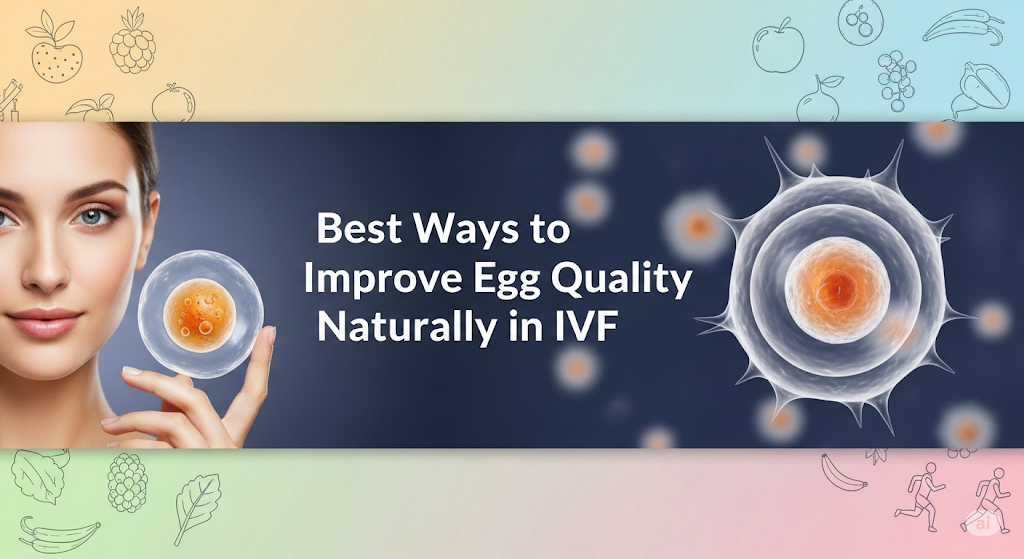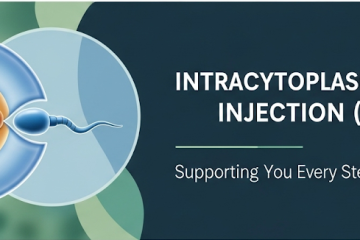Best Ways to Improve Egg Quality Naturally in IVF
Improve Egg Quality Naturally in IVF :- Egg quality plays a crucial role in the success of in-vitro fertilization (IVF) and overall fertility. Women with healthier eggs have a higher chance of successful conception and a healthy pregnancy. While age is a significant factor in egg quality, there are many natural ways to improve it. This guide explores the best strategies to enhance egg health naturally for IVF.
Understanding Egg Quality
Egg quality refers to the ability of an egg to be fertilized and develop into a healthy embryo. Good-quality eggs have the right chromosomal content and sufficient energy reserves to support early embryo development. Factors like age, lifestyle, and environmental influences can impact egg health.
1. Maintain a Healthy Diet
Nutrition plays a vital role in improving egg quality. Eating a balanced diet rich in vitamins, minerals, and antioxidants helps support ovarian function. Consider the following:
- Fruits and Vegetables: Rich in antioxidants like vitamin C, E, and beta-carotene, which protect eggs from oxidative stress.
- Healthy Fats: Omega-3 fatty acids found in fish, walnuts, flaxseeds, and chia seeds improve egg quality.
- Lean Proteins: Sources like eggs, chicken, beans, and lentils provide essential amino acids for cell development.
- Whole Grains: Brown rice, quinoa, and oats help maintain stable blood sugar levels, which support hormonal balance.
- Dairy or Alternatives: Greek yogurt, cheese, and plant-based alternatives supply calcium and vitamin D, crucial for reproductive health.
2. Stay Hydrated
Proper hydration supports cellular function, including egg development. Drinking at least 8-10 glasses of water daily helps flush out toxins and maintain optimal blood flow to the reproductive organs.
3. Exercise Regularly (But in Moderation)
For Improve Egg Quality Naturally in IVF Regular physical activity helps improve blood circulation, regulate hormones, and reduce stress levels. However, excessive exercise can negatively impact ovulation. Aim for moderate activities like:
- Yoga
- Walking
- Swimming
- Light strength training
4. Maintain a Healthy Weight
Being overweight or underweight can affect hormone levels and ovulation, impacting egg quality. Maintaining a BMI within the healthy range (18.5-24.9) helps regulate reproductive hormones.
5. Reduce Stress
Chronic stress can negatively impact fertility by disrupting hormonal balance. Stress management techniques like meditation, deep breathing, and mindfulness can help. Consider:
- Practicing yoga
- Engaging in hobbies
- Spending time in nature
- Trying acupuncture
6. Get Enough Sleep
Sleep plays a significant role in hormonal balance and reproductive health. Aim for at least 7-8 hours of quality sleep per night. Establish a bedtime routine, avoid screens before bed, and maintain a consistent sleep schedule.
7. Limit Caffeine and Alcohol Intake
- High caffeine intake (more than 200 mg per day) has been linked to reduced fertility. Limit coffee and caffeinated drinks.
- Alcohol consumption can disrupt hormone balance and decrease egg quality. It’s best to minimize or avoid alcohol when preparing for IVF.
8. Avoid Smoking and Environmental Toxins
- Smoking damages egg DNA, accelerates ovarian aging, and reduces egg count.
- Exposure to chemicals in plastics, pesticides, and household products can negatively affect egg quality. Opt for organic produce, glass containers, and natural cleaning products.
9. Take Key Supplements
Certain supplements support egg health and fertility:
- Coenzyme Q10 (CoQ10): Boosts mitochondrial function and energy production in eggs.
- Folic Acid: Essential for DNA synthesis and early fetal development.
- Vitamin D: Supports ovarian function and hormone balance.
- Myo-Inositol: Helps improve egg quality in women with PCOS.
- Omega-3 Fatty Acids: Reduce inflammation and improve blood flow to reproductive organs.
- Zinc and Selenium: Support antioxidant defenses and egg maturation.
Consult your doctor before starting any supplements.
10. Consider Acupuncture and Herbal Medicine
- Acupuncture enhances blood circulation to the ovaries, reduces stress, and balances hormones.
- Certain herbal supplements like maca root and chasteberry may improve egg health, but they should only be used under medical supervision.
11. Track Ovulation and Hormone Levels
Monitoring ovulation and hormonal balance can help optimize fertility:
- Use ovulation predictor kits (OPKs)
- Track basal body temperature (BBT)
- Get regular fertility hormone tests
12. Plan IVF at the Right Time
Egg quality declines with age, so discussing fertility preservation options like egg freezing or earlier IVF treatment can be beneficial.
Conclusion
Improving egg quality naturally requires a holistic approach, including a healthy diet, lifestyle changes, stress reduction, and proper supplementation. While age is a factor, adopting these strategies can enhance the chances of IVF success and overall reproductive health. Consulting a fertility specialist for personalized advice is always recommended.





